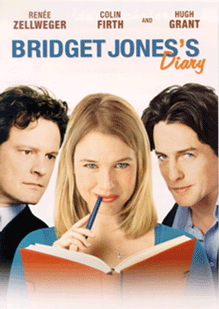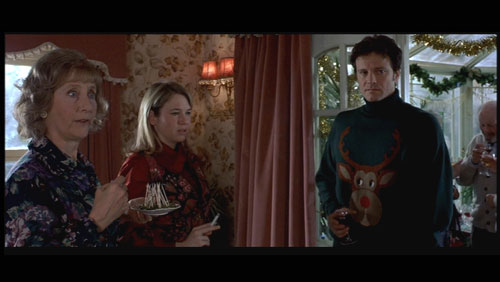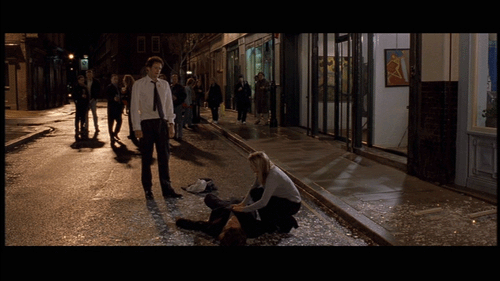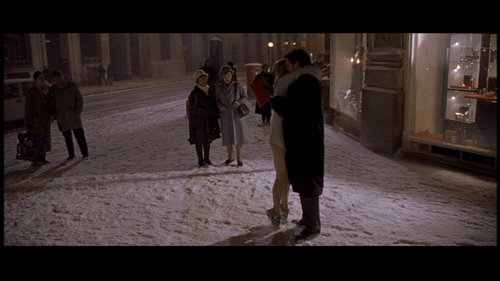
CINEMATIC ALLUSIONS TO LITERARY WORKS
BRIDGET JONES’S DIARY (2001)

In Bridget Jones’s Diary, a busy young career woman, Bridget Jones, is just as blind to the possibility of romantic attachment to someone she perceives to be a snob as a young woman of the late eighteenth-century. Although this 2001 film about a young woman working in a London publishing firm is an adaptation of the novel with the same title by Helen Fielding, the author acknowledges the novel Pride and Prejudice by Jane Austen as the basis for this story.1
In this film adaptation Bridget Jones’s adventures and quest to find a man while attempting to gain control in her life are chronicled. The eighteenth-century heroine, Elizabeth Bennet, attempts to gain control over her life and secure her own financial future despite a well-meaning matchmaking mother and the interference of four sisters. The timelessness of the story illustrates how similar young people living in the eighteenth-century are to the young people of today.
Sydney Van Nort
Archivist, Library
1 Cecilia Saber, “Bridget Jones and Mark Darcy: Art Imitating Art … Imitating Art,” Persusasions, 22: 1 (2001). http://www.jasna.org/po104/salber.html.
 |
Mark Darcy (Colin Firth) is introduced to Briget Jones (Renée Zellweger) by her mother (Gemma Jones) at the New Year’s Turkey Curry Buffet. Mr. Darcy walked off; and Elizabeth remained with no very cordial feelings towards him. She told the story however, with great spirit among her friends; for she had a lively, playful disposition, which delighted in anything ridiculous. |
Bridget Jones (Renée Zellweger) rejects Mark Darcy (Colin Firth) while bending over Daniel Cleaver (Hugh Grant) following a fistfight between the two men. “You are mistaken, Mr. Darcy, if you suppose that the mode of your declaration affected me in any other way, than as it spared the concern which I might have felt in refusing you, had you behaved in a more gentlemanlike manner.” She saw him start at this, but he said nothing, and she continued: “You could not have made me the offer of your hand in any possible way that would have tempted me to accept it.” |
 |
Again his astonishment was obvious; and he looked at her with an expression of mingled incredulity and mortification. She went on: “From the beginning–from the first moment, I may almost say—of my acquaintance with you, your manners, impressing me with the feelings of others, were such as to form that groundwork of disapprobation on which succeeding events have built so immovable a dislike; and I had not known you a month before I felt that you were the last man in the world I could ever be prevailed upon to marry.” |
|
 |
Mark Darcy (Colin Firth) proposes to Bridget Jones (Renée Zellweger). “Your surprise could not be greater than mine in being noticed by you. My conscience told me that I deserved no extraordinary politeness, and I confess that I did not expect to receive more than my due.” [Elizabeth Bennet] “My object then,” replied Darcy, “was to show you, by every civility in my power, that I hoped to obtain your forgiveness, to lessen your ill-opinion by letting you see that your reproofs had been attended to. |
How soon any other wishes introduced themselves I can hardly tell, but I believe in about half-an-hour after I had seen you.” |
|
Brooks, Richard. “Always Hard to Turn an Iconic Book into a Movie.” Sunday Times (London) 22 April 2001.
Case, Alison. “Authenticity, Convention, and Bridget Jones’s Diary.” Narrative 9.2 (2001): 176-179.
Saber, Cecilia. “Bridget Jones and Mark Darcy: Art Imitating Art.” Persuasions 22.1 (2001).
| Previous Movie | Return to main page | Next Movie |
Copyright © The City College Library www1.ccny.cuny.edu/library |
||